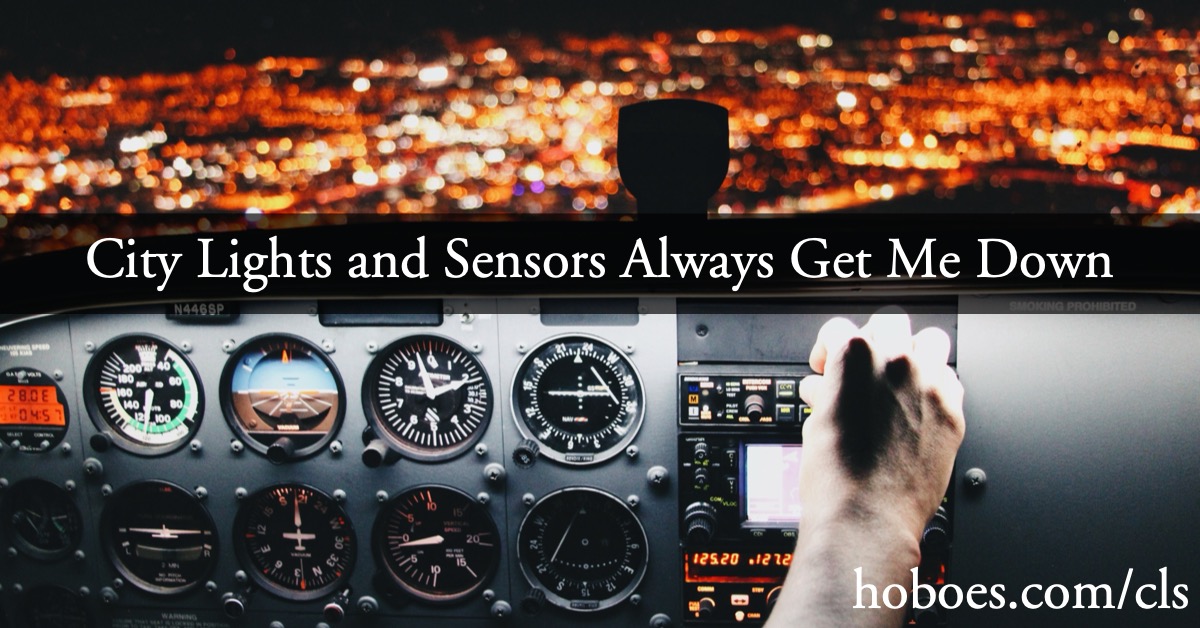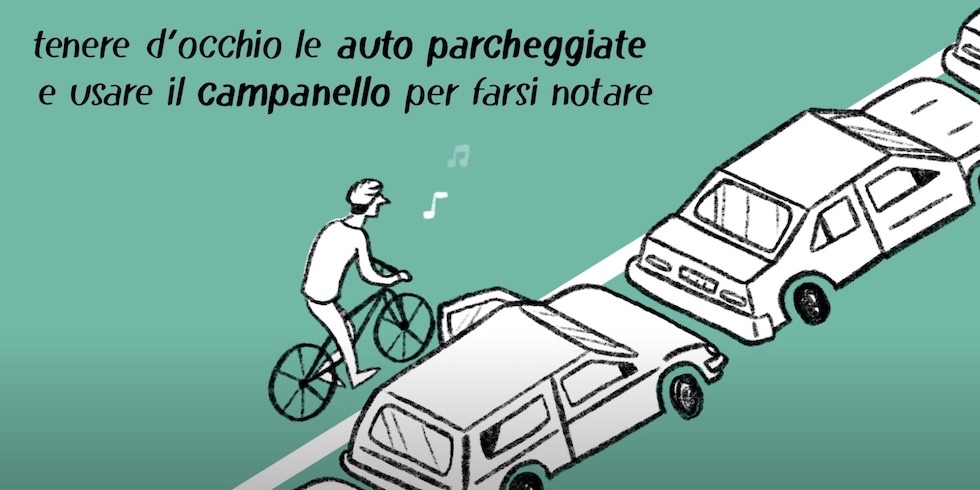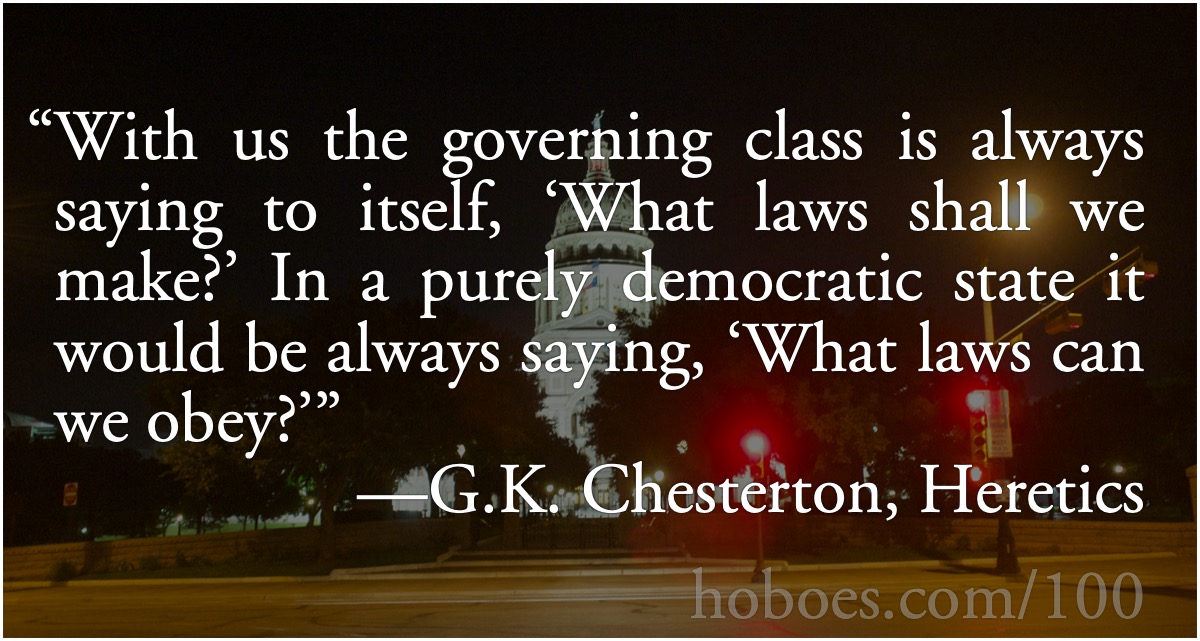A one-hundred-percent rule for traffic laws
If you ask people what laws most cause a disrespect for law, a lot of people would answer, our insane drug laws. Others might answer our laws that disarm the law-abiding, giving murderers free rein to kill. Aficionados of older media might answer copyright laws. Nobody who cares about older media follows copyright laws—you can see this all over even mainstream sites such as YouTube. Parents might point out that laws making it illegal for children to sell lemonade or hold bake sales teach even the very young that some laws are meant to be broken.
But the real answer is so ubiquitous it’s invisible. If there is one set of laws that most causes a disrespect for law, it is our traffic laws. All of my examples above were made with the expectation that people would actually follow them or that people would be arrested for not following them. There is no such expectation with traffic laws. Cities and states create laws that they expect everyone to break, and then set up their budgets so that if everyone followed those laws they’d go broke.
That’s the real kicker about these laws: if you look at city and state budgets, they very clearly need people to break traffic laws. That’s why you don’t go to jail for speeding. The government needs your fine, and it needs you to keep speeding to pay more fines.
Speed limits are not set for safety. The rule of thumb for setting safe speed limits is to set the speed limit at the 85% level. That is, where 85% of drivers are driving that speed or less in free-flowing conditions. Decades of studies show that the 85th percentile is far safer than slower speeds. For reasons beyond the scope of this post, most people naturally drive at the speed safe for any particular road.
Most roads don’t have the speed limits even as high as the safe 85% level. On most roads the speed limit is set so dangerously low that anyone traveling at the limit is at serious risk of causing an accident; police know this and only ticket less than one percent of violators, while still retaining the option of literally stopping anyone on the road.
Yes, even if you’re one of the very few who cause traffic accidents by driving under the speed limit, you can be stopped and ticketed. You’re guilty of violating the law against unsafe driving. Drivers can be stopped for “impeding traffic” when driving at, under, or over the limit.
It’s as if the law against murder encompassed everything from cold-blooded murder, to giving someone a bruise in a touch football game. It turns out to be easier, safer, and more lucrative to go after the kids at the game.
But even where speed limits are set at the 85th percentile, that means that more than one out of ten drivers are traveling faster than the legal limit. While the 85% rule makes sense from a geeky engineering standpoint, it makes no sense for public policy. Where else in crime or public safety do we follow an 85% rule? Do we create laws against violent crime such that you can murder this brutally, but no more, or rape this many people, but no more?
Most laws, at least laws that are followed, are set where we are at least initially willing to arrest, try, and imprison 100% of offenders—and think ourselves capable of doing so.
The problem with speed limits isn’t not following the 85% rule, though that’s a serious problem. It is in taking dangerous behavior and defining it down so much that it becomes dangerous not to break the law. It would be madness to say of other crimes that police should sit by crime-ridden areas, watch murder after murder occur, and decide on the fly which tenth of a tenth of a percent to arrest.
This is what happens when governments make money from lawbreaking. It’s a lot easier to make money from people who aren’t dangerous than from people who are. This is something city governments are well aware of: the dangerous offenders never pay their fines. This is why my own community ended their red light program: the only people who paid the fines were locals, and the town was small enough at the time that the city council responded to their complaints.
Imagine setting food safety regulations so that the inspectors see violations literally every minute, and specifically cite fractions of a fraction of a percent of them? It would breed corruption, and encourage unsafe food. The way we treat safety on our roads is madness. We make normal behavior a crime and then enforce it haphazardly.
The correct way to set speed limit laws, as it is for other laws, is to set the speed limit at the one hundred percent point: the point at which police will arrest one hundred percent of drivers who exceed it. This takes away the profit motive from governments. They’ll have to decide what they’re willing to pay for safety, instead of how much safety they’re willing to trade for increased revenue.
It also takes away special treatment. We don’t have special license plates for government workers that allow them to assault people. Yet, government workers are often exempt from any risk of being fined for traffic violations. To the point of having license plates that tell the police not to bother stopping them!
I we’re exempting government employees from a law, it probably shouldn’t be a law.
That’s a good sign that these are not real crimes. If we seriously looked at what we want to be crimes and what we don’t, I think we would completely overhaul law enforcement priorities. Currently, ticketing people who are driving at safe speeds on the highway is high priority. It brings in money. Someone trying to access your financial records or steal your credit cards or break into your car is low priority. Financial institutions don’t even report the former to the police anymore; police discourage you from reporting, or outright refuse to take reports for the latter. But if we were to apply the one-hundred-percent rule to our laws, I think the general public would easily say, yes, everyone who tries to break into my bank account or my car should be arrested and charged.
The same is true with burglary, and assault. The general public would prioritize those crimes. Many probably already think those crimes are higher priority than traffic violations. Looking at laws through the 100% rule would mean prioritizing those crimes that really do hurt people, rather than literally criminalizing behavior everyone does, in order to make more money off of fake crimes.
- April 2, 2025: City Lights and Sensors Always Get Me Down
-

News of the DC helicopter-airliner crash came literally the day I put Italian road safety to bed. By following the forty eight hour rule into forty-eight days plus, I’m able to choose the most interesting of the hot takes, some of which are very relevant to our current policy of adding complexity wherever we see safety issues.
Because what became clear immediately and continued to be clear was the complete lack of surprise from pilots who fly that airport. It was incredible reading about the problems pilots have long complained about at Reagan National in light of the perspective and distraction problems that I covered when talking about pedestrians, cyclists, and motorists.
These complaints by pilots may well not be the reason the helicopter and passenger jet collided; that story seems to get weirder by the week. But they point to an ongoing problem that will only get worse in the air and on the ground until and unless we take it seriously. For a particularly well-written example of what I’ve been seeing, here’s commercial pilot Chris Palmer:
What I think happened in this case:
In this case air traffic control calls out to the helicopter and ask them if they see the regional jet. In this case, they called them an RJ, for shorthand.
The helicopter confirms that they see the RJ and will pass behind as instructed.
But human error, being a main cause, it’s highly likely that the helicopter crew saw the departing regional jet, which can also be seen in this video, with this landing light climbing up from the runway.
Misidentifying this aircraft that was further to the right or starboard of the helicopter, they indeed thought they were passing behind that regional jet with plenty of room to spare.
What they didn’t know, with their eyes turned to the right, was that there was an aircraft approaching them from the left. The one that they were actually supposed to be looking for.
To the airliner, and to any aircraft on a collision course, they can often be impossible to see. Especially considering this was at night, and at low altitude, the anti-collision lights on the helicopter could have easily been lost in the bright lights of the city in the background of the helicopter from the airliners perspective.
- February 5, 2025: Italian road safety campaign social media backfire
-

Translation: “Keep an eye on parked cars, and use your bell to be noticed.” This should not be controversial, although I might quibble with the bell.
I’ve been reading Il Post lately, both to improve my very bad Italian and to gain a non-American, non-English perspective on the news of the day. Yet somehow I missed this article about a “scandal” in Lombardy until a friend brought it to my attention with the comment “This is funny.”
It is funny, and a very good example of why I avoid social media. In a virtual environment we lose any sense of reality. In this case, it appears that a local government was actually doing something substantive to keep pedestrians and bicyclists from being killed by inattentive drivers. It turned into a social media scandal because… it told people how to effectively stay alive rather than laying blame and letting them die!
I’m not going to translate the whole thing. It’s not worth the trouble and in any case my Italian is not up to the task. The title is The questionable campaign on street safety in Lombardy. The subtitle is:
È stata sospesa dopo molte critiche a un post che dava consigli ai pedoni per evitare di farsi investire, dando un po' l'impressione di colpevolizzarli
That is, in my rough Italian:
It [the safety program] was suspended after much criticism to a post that advised pedestrians on how to avoid getting hit, giving a bit of an impression of blaming them.
The thing is, that bit of blame is no more than saying that some pedestrians don’t pay attention to the possibility of dangerous drivers when using the street. I do a lot of walking when I travel, and this is demonstrably true. Judging from the campaign’s graphics, the campaign was not about assigning blame but about saving lives.
- Can You Get a Ticket for Driving Too Slowly?: Brook Kottman
- “You will know you’re driving too slowly if you’re going under the posted speed limit. Some states, like California, have laws where you need to keep up with the flow of traffic—if a series of cars attempt to pass you, this is a clear indication that you’re driving too slowly.”
- Is It Illegal to Drive Under the Speed Limit?
- “How slow can you drive under the speed limit? Most states have concluded that this question is best dealt with on a case by case basis… Most state laws do not specify how far below the speed limit is legal. They leave that decision to the highway patrol officer, but a good rule of thumb is that it is illegal to drive at a speed so slow that you hold up the normal traffic flow.”
- Special license plates shield officials from traffic tickets: Jennifer Muir
- “An Orange County Register investigation has found that the program, designed 30 years ago to protect police from criminals, has been expanded to cover hundreds of thousands of public employees—from police dispatchers to museum guards—who face little threat from the public. Their spouses and children can get the plates, too. This has happened despite warnings from state officials that the safeguard is no longer needed because updated laws have made all DMV information confidential to the public.”
- Traffic Tickets for Driving Too Slowly
- “Any vehicle proceeding upon a highway at a speed less than the normal speed of traffic moving in the same direction at such time shall be driven in the right-hand lane for traffic or as close as practicable to the right-hand edge or curb, except when overtaking and passing another vehicle proceeding in the same direction.”
More reigning in bad laws
- A free market in union representation
- Every monopoly is said to be special, that this monopoly is necessary. And yet every time, getting rid of the monopoly improves service, quality, and price. There is no reason for unions to be any different.
- Bipartisanship in the defense of big government
- We’ve got to protect our phony-baloney jobs. Despite their complaints about Trump’s overreach, Democrats have introduced legislation to make it harder for them to block his administration’s regulations.
- The Last Defense against Donald Trump?
- When you’ve dismantled every other defense, what’s left except the whining? The fact is, Democrats can easily defend against Trump over-using the power of the presidency. They don’t want to, because they want that power intact when they get someone in.
- The Sunset of the Vice President
- Rather than automatically sunsetting all laws (which I still support), perhaps the choice of which laws have not fulfilled their purpose should go to an elected official who otherwise has little in the way of official duties.
- The pseudo-scientific state and other evils
- In 1922, following the first world war, G.K. Chesterton discovered to his dismay that the evils of the scientifically-managed state had not been killed by its application in Prussia. Unfortunately, it was also not killed by its applications in Nazi Germany.
- 20 more pages with the topic reigning in bad laws, and other related pages
More speeding laws
- Round Rock extends dangerously low speed limits on Highway 79?
- Are accidents along Highway 79 in Round Rock the result of speed limits that are too high, or are they the result of speed limits too far below the 85th percentile?
- Speed—and safety—winning over the traffic ticket lottery
- The double-entendre from the eighties was that speed kills, but speed—at least the traffic kind—is winning. On a straight highway, until the speed limit hits 70, most drivers ignore it.
More traffic laws
- Speed—and safety—winning over the traffic ticket lottery
- The double-entendre from the eighties was that speed kills, but speed—at least the traffic kind—is winning. On a straight highway, until the speed limit hits 70, most drivers ignore it.
- Bad laws cause crime
- “Honestly, the level of apathy I’m dealing with is maddening.” Bad laws make it easy to get away with breaking them.
- Speeding and budgets: Conflict of Interest
- Obviously, the money generated by speed laws creates a conflict of interest for state lawmakers, who will need more “lawbreakers” in order to meet budget numbers. But the conflict of interest doesn’t always stop there.
- Driving laws too complicated for DMV
- It appears that California’s driving laws are so complicated that even the DMV and the California Highway Patrol get confused.
- Targeting critics of the law
- When Canadian journalist Kerry Diotte criticized red light cameras in Edmonton, Edmonton police started looking for a reason to arrest him.
- Four more pages with the topic traffic laws, and other related pages

